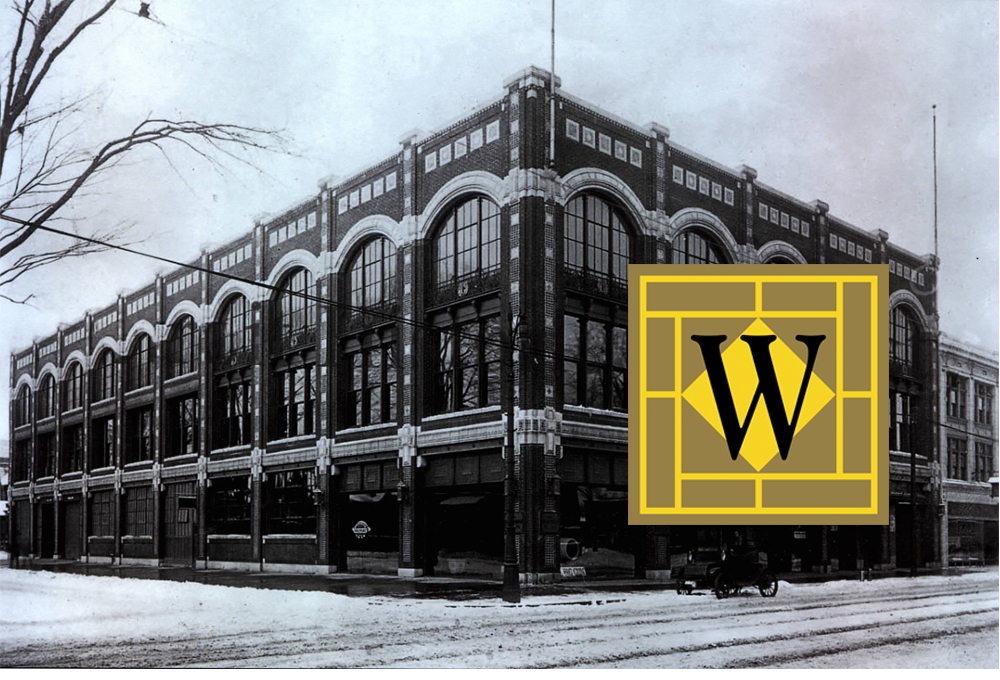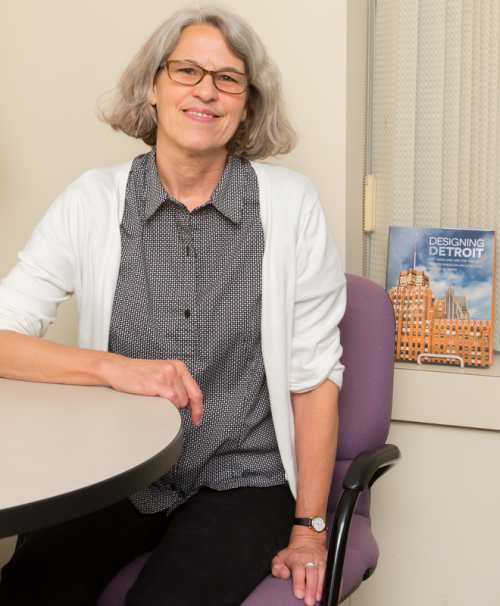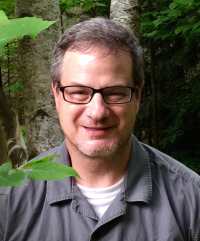Wayne State University Press: 75 Years as a Voice for Diverse Detroit and Michigan

First, I have a bias. I went to Wayne State University in Detroit as a journalism and English major in the mid-’80s. I love Detroit, through good times and bad, and enjoyed almost every day at WSU. With its an urban campus, an older student body, and colorful local arts and literature scene, attending WSU truly helped prepare me for real life outside college.
It’s this urban setting that also helps Wayne State University Press keep producing books of great quality. Not only that, but its location in Michigan, with its diverse climate, landscape, and people, have made this midsize university press an important voice for the history, culture, and environment of this Great Lakes State and beyond.
Wayne State University Press recently celebrated its 75th anniversary, so I thought that would be a great way to have an in-depth discussion with Kathryn Wildfong, interim director and editor-in-chief at Wayne State University Press.
First, tell me a little bit about your background and how you came to be interim director and editor-in-chief at Wayne State University Press.

Kathryn Wildfong: 'There are a lot of important stories to tell about Detroit's past, present, and future.'
I very much fell into working at the Press. I was a grad student in English and, in fact, I didn’t even realize Wayne had a press until my dissertation adviser encouraged me to apply for a part-time editorial position that had become available at the Press. I started out in the manuscript editing department, proofreading and learning to copyedit manuscripts, and felt like this was home almost immediately. I never went back to the dissertation. I was hired full time in 1987, became managing editor in 1991, and then moved into acquisitions in 2003. I’ve acquired books in most of the areas we publish at some point, but for the last ten years or so I’ve mostly acquired our regional books and Jewish studies.
As an urban university press, in the heart of a city that has had its share of bad press (but is on the rebound now), does WSU Press have any specific responsibility toward promoting Detroit, itself?
Detroit is a big part of who we are and what we do. In our regional publishing program we have tried to maintain a balanced view, avoiding both the “ruin porn” fixation and a chamber of commerce approach. There are a lot of important stories to tell about Detroit’s past, present, and future, both good and bad, and we see our role in telling those stories—and giving voice to a range of perspectives—as a crucial part of our mission.
I went to Wayne State back in the early ’80s. I remember a thriving Cass Corridor poetry and arts scene back then. Do you help promote local talent?
Our Made in Michigan Writers Series, the brilliant creation of my colleague Annie Martin, is specifically designed to promote Michigan writers. Many of the authors of the 50 volumes of poetry, short fiction, and creative nonfiction that we’ve published so far in the series are from the Detroit area, but the series highlights very talented people from all over the state. We also use Michigan-based artists for book design and illustrations. And of course we’ve published a number of other books by and about local artists and writers—from Detroit-focused poetry collections like Abandon Automobile to our regional fiction for young readers such as Jean Alicia Elster’s The Colored Car and Who’s Jim Hines, to books like Canvas Detroit and Essay’d that highlight the work of the many artists currently working in and around Detroit, to books about Detroit’s music scene, past and present, such as Heaven Was Detroit.
WSU Press spotlights the diverse talents, history, and culture of Michigan. What is it about Michigan that makes it so diverse?
My guess is it probably begins with the state’s considerable geographical and geological variety—its many different microclimates make Michigan the second most agriculturally diverse US state, for instance. We have Great Lakes, many inland lakes and rivers, extensive and varied kinds of farmland, forests, rich mineral deposits … Michigan has drawn a great variety of people at different periods of history for a variety of reasons—for its rich natural resources, its proximity to Canada, its industries, its beauty, its cultural activity, and so on. All of these groups have made important, and very different, historic, economic, and cultural contributions.
Do you, and university presses in general, need to balance your role as part of a university with a need to publish books that appeal to a general audience?
There definitely is a balance that we try to reach between books and journals that appeal to very specialized audiences of scholars and students, and material for a broader audience. Some of that is a financial necessity, as our primary market for academic books and journals—libraries—has shrunk over the years. Books can be shared much more easily in both print and electronic formats, library budgets are under pressure from a variety of directions … these and other factors make the economics of publishing increasingly challenging—even if your goal as a nonprofit is to simply cover your costs. So although we were created to publish scholarly work, we have over the years needed to balance that with books that serve a broader readership. We now talk about serving many communities of readers and writers.
One of your specialties is Judaica. Is this because of the rich Jewish history in the Detroit area?
That is definitely a part of it, and we had strong support from members of the Detroit-area Jewish community from our earliest years. Back in the 1950s, Press benefactor Leonard Simons created a Board of Advisors to help underwrite book production costs, and also introduced the Press to fellow Detroit businessman Morris Schaver, who, with his wife, Emma, set up a fund for the Press at the university to support publication of books in Jewish studies. With that fund, the Press published some important books in Jewish history. Then Robert Mandel, who was director in the 1980s, expanded the program, initiating a number of new book series, several of them in Jewish studies. Only one of those is still active, but in the decades since then we’ve developed an extensive, highly regarded, and diverse list in Jewish history and culture.
How active is WSU faculty in advising you?
Our editorial board, which must approve publication of the books we publish under the WSU Press imprint, is made up of WSU faculty from a variety of disciplines, largely from the humanities, arts, and social sciences. A number of faculty have cycled on and off the board, and we maintain relationships with a good number of them. We also have a core of long-serving members who’ve played a huge role through their advice, support, and sometimes their prodding. That said, the role of the board is to make sure scholarly standards are maintained, not to control the direction of our program.
We sometimes ask faculty members to be peer reviewers, or informal advisers of some kind, as well. A number of our authors and series editors are also faculty members, or have been in the past. While we work with faculty at universities throughout the world, we highly value and continue to seek out productive relationships with WSU faculty.
Something we are focusing on in the near future is to create some new publishing initiatives in current areas of WSU’s focus, for example issues in urban health care, including health disparities, and we’re looking to university faculty to help us do that. We’re also looking at some innovative ways we can more directly serve university faculty and students.
My father went to Wayne many, many years ago, I went there, and so did my wife. I know how great an experience it is to go to school in Detroit. But are there any myths about Detroit you’d like to dispel?
Well, one myth is that Detroit is one thing, good or bad. It’s certainly not now and has never been that. Detroit is often described as having had alternating periods of highs and lows, but during its highs it’s never been great for everyone, and during the lows Detroit has still had great things, great people.
I think the idea that Detroit’s current “comeback” means Detroit is once again a livable place really rankles people who’ve been living here all along, and it also risks overlooking the partial nature and fragility of “success” and the inequities that not only persist, but are often exacerbated by “success.”
It’s a way more complicated place, and a way more complicated story than is often recognized. There are many, many stories to be told about Detroit—which I guess is good for a publisher with a commitment to telling Detroit stories!
After 75 years, has the mission of WSU press changed or evolved? Where do you see it in another 75 years?
Our mission has definitely evolved over the years. Originally it was purely, and rather vaguely, a scholarly one, and the Press published books on a very wide variety of topics—one requirement being scholarly merit and the other financial underwriting for production. Over time, and when marketing books was less of a concern for university presses, our books and journals ranged far and wide.
Our deep backlist includes lots of books on topics that seem strange to current staff, a few of which—the sexily titled Epicyclic Drive Trains, for example, or our guide on how to play squash, Squash Rackets—have become perpetual sellers and remain in print today. Our list is much more focused now on fewer areas, areas in which we can develop expertise and a strong reputation. Today we see our mission as both more closely tied to our parent institution’s core mission of research, teaching, and service, and more responsive to the needs of both local and global communities of readers.
Thinking not only about how much has changed in publishing over the past 75 years, but the rapidity of change over the last five or ten, I wouldn’t even hazard a guess about where WSU Press might be in another 75 years. That said, I’m pretty certain that the needs that university presses fill, for original, well-researched, well-vetted, intelligent and thoughtful, well-produced information and creative work about important things—things that might have niche audiences rather than broadly popular ones—will remain.
The people I know who work in university press publishing, very much including the staff at WSU Press, are very smart, creative, innovative, committed folks who care deeply about the quality of the work they do and the impact it can have, regardless of whether it’s in print, digital, audio, or something yet to be imagined. They’ll figure it out, I’m sure.

Howard Lovy is executive editor at Foreword Reviews. You can follow him on Twitter @Howard_Lovy
Howard Lovy
